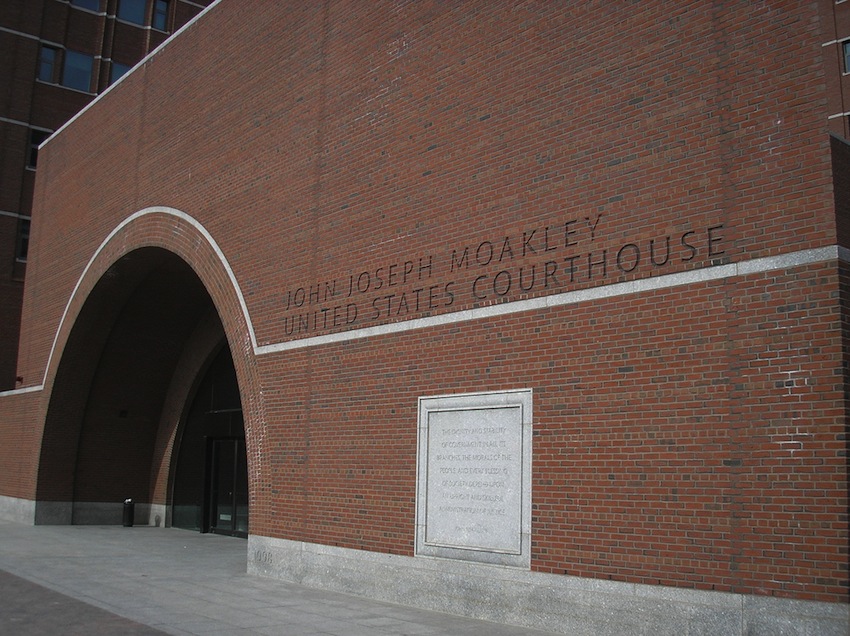The Court Battle Over ‘Pro-Israel’ Billboards Could Be a ‘Tough Win’ For the MBTA

Moakley Courthouse photo uploaded by UkemeE on Flickr
As the MBTA heads to court on Wednesday to defend its decision to keep anti-Islamic ads off of certain train platforms and vehicles, they may have a tough time convincing a judge that their opposition to the signage was in the public’s best interest.
“I wouldn’t say they have no leg to stand on, but I would say they have a difficult standard they need to prove,” said Matt Sienkiewicz, an assistant professor of communication and international studies at Boston College.
Sienkiewicz, who became interested in the MBTA’s pending case in federal court due to his studies in global media cultures and media theory, said the T will have to prove that their decision to deny an organization’s request to post billboards was not an infringement of their First Amendment rights. “It isn’t impossible. There is nothing wrong with banning demeaning speech, but you have to show you are doing it consistently,” he said.
The court date is the result of a suit filed against the transit agency in November by the American Freedom Law Center, on behalf of Pamela Geller and Robert Spencer, members of the American Freedom Defense Initiative (AFDI).
Gellar and Spencer sought to place posters at more than 10 MBTA stations that read:
In any war between the civilized man and the savage, support the civilized man. Support Israel. Defeat jihad.
The message was in response to a pro-Palestinian advertisement that was allowed to go up in 80 locations around the T’s system in October, which depicted the “Palestinian loss of land — 1946 to 2010” alongside images of a shrinking landscape.
Because those ads went up, but AFDI’s were denied due to “demeaning” language that allegedly violated the T’s advertising policy, the group sued the MBTA. They then filed an injunction in federal court to try and force the agency to place the posters, citing the MBTA’s censorship of their pro-Israel advertisement, and promotion of the other, as a violation of AFDI’s First and Fourteenth Amendment rights.
“The fact that the MBTA displayed the anti-Israel advertisements yet rejected our clients’ advertisement clearly demonstrates that the MBTA either picked sides in the ongoing Israeli and Palestinian debate or caved in to political correctness,” said Robert J. Muise, AFLC Cofounder and Senior Counsel.
On Monday, MBTA spokesman Joe Pesaturo said the T is not opposed to groups expressing their points of view, “… but it must be done in a respectful manner that recognizes and appreciates the cultural diversity of a public transit environment,” Pesaturo said.
The MBTA will have their own legal counsel at the helm during Wednesday’s hearing at the Moakley Courthouse, but Sienkiewicz believes their job could be a difficult one. “It’s going to be a tough win,” Sienkiewicz said, pointing out that the real question is whether the MBTA is consistently and reasonably applying their standard of what constitutes “demeaning speech” when placing ads on their vehicles and at stops. “I think if it’s a close call, then the court ultimately has to say, even if they don’t like the speech, that protecting it is important. I don’t think it’s a simple case, but I think the cards are stacked against the T.”
Sienkiewicz said the prior placement of the pro-Palestinian ad makes the court case that much harder, putting the transit agency in “the worst possible position”—something that could have been avoided if they kept the first ad off the walls, too.
“What the T has to show is that the demeaning nature is fundamentally different from the other ads. It’s difficult for them to shut off half of the conversation. You have to really show, and be very careful, when allowing part of a conversation to take place and not another part,” he said. “There’s nothing wrong with the MBTA putting up a set of rules, but what they can’t do is selectively apply those rules. I think they have trouble ahead, but it’s not an open and shut case.”
Beyond the outcome of Wednesday’s hearing, Sienkiewicz thinks that people should use this debate about free speech as an opportunity to discuss the ongoing conflict between Israel and Palestine, rather than focus only on censorship in American culture.
“If we accept the world can be divided the way the ‘defeat jihad’ ad suggests, then we give up on the struggle for peace and resign ourselves to war. That’s not grounds for the ads to be banned, of course,” he said. “But from a humanistic perspective, it’s crucial we think beyond legal terms and discuss these issues beyond legal frameworks. They probably should not be censored, but the debate over them should be used as an opportunity to reconsider the terms on which we want to discuss one of the most difficult, controversial issues of our day.”


